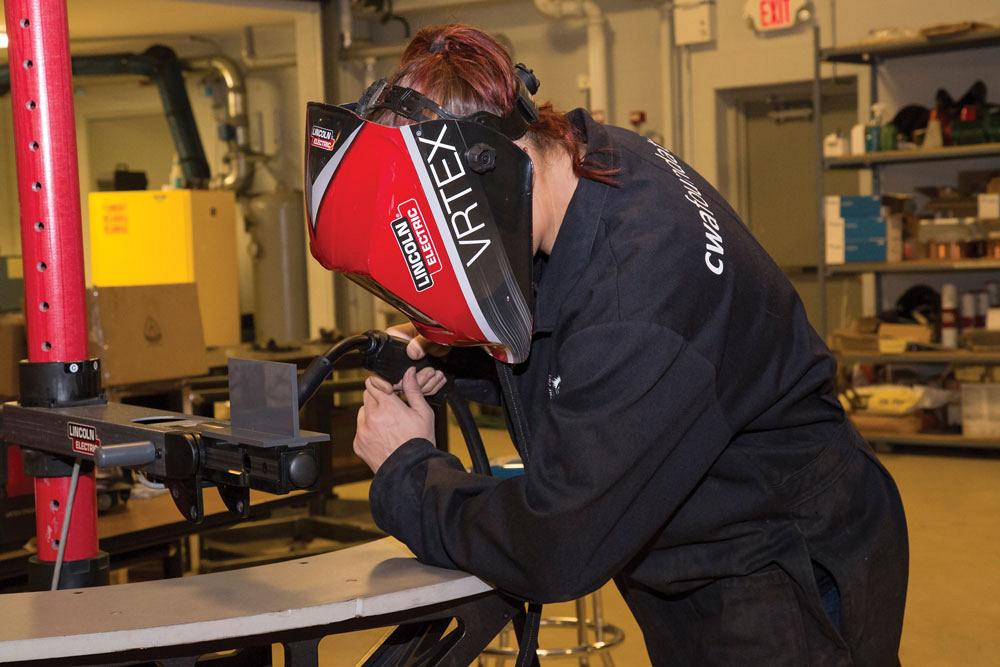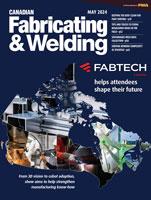- FMA
- The Fabricator
- FABTECH
- Canadian Metalworking
Women in the trades: still more to be done
While women have torn down barriers in most workforce environments, their involvement in the trades still could use a boost
- March 25, 2019
Women have made leaps and bounds in many areas of the workforce, but their involvement in the trades remains alarmingly low. They account for just 4.5% of skilled trade workers in Canada.(1) There are many reasons that women are not seen in the skilled trades market, some of which can be blamed on common misconceptions and others on unfair treatment in the workplace. However, there is no doubt that employers have realized that the gaping shortage of skilled workers can be filled with the right training and a change in attitude toward welcoming women into the trades.
It is no secret that working in the welding sector and many other trades often can be physically demanding. This is one of the top concerns when promoting welding to women: the idea that a woman is incapable of working in a job that requires physical ability. However, this couldn’t be further from the truth.
The team at CWB Group had the opportunity to speak to many women currently employed in the trades, specifically in the welding sector, and found that not only are they working as welders, but they are taking on various leadership roles in their organizations. They believe that although physical strength is essential to getting certain aspects of the job done correctly and efficiently, it takes more than just power and muscle.
“There are preconceived notions about whether women can handle themselves in a male-dominated environment,” said Jamieson Pouw, market development manager at The Bucket Shop. “However, we at The Bucket Shop quickly realized that skills show themselves. Whoever is making sparks will be seen pretty fast, and that is what levels the playing field. When a worker, be it male or female, is placed beside a large piece of equipment, and the output is identical, it drops a lot of barriers between people and allows for many women to be welcomed as productive, contributing employees.”
The Bucket Shop provides products for all mining bucket applications and has been in business for almost 30 years. It has witnessed and experienced many significant changes over that time, including watching the organization transition from being an all-male environment to one that is eagerly opening its doors to women.
“Our culture has evolved … [and we are] embracing a flat model that collaborates for more learning opportunities,” said Pouw. “We view mistakes as our biggest opportunities to learn and want to create an environment that employees are excited to be in.”
The Bucket Shop quickly learned that it was no longer part of an industry that had the pick of the land when it came to tradespeople. It adapted to the growing needs of the skilled trades and adjusted its culture to recognize the importance of placing the right people in the right jobs.
After speaking to a number of women that work in the trades, or who have at one point enjoyed a career in welding, we found that the notion that welding is an old boys’ club was accurate in many instances. Considering that every person entering any field of work has the desire to grow and prosper in their chosen path, there is a deep-seated fear of the lack of learning opportunities and promotions available for women.
There is little doubt that many women have had negative experiences that have reinforced their doubts about whether the shop floor is a place for them. One woman’s account of her experiences in the industry played into the generalization that the field is no place for a woman. “Why do you work here anyway? You should be a teacher or something, you shouldn’t be out here with us” is just one example of the discrimination that she had to endure.(2)
In instances such as these, we need to focus our resources on educating men on the benefits of diversity in the field and the value that women can bring to the job.
With that said, many women have positive experiences as well, and their male colleagues have not only accepted them, but helped them prosper in their jobs. Employers who recognize the dire need for women in the workplace have made significant changes to their training processes, including implementing cross-training in which employees can share their expertise, creating a more symbiotic environment for company employees.
The Bucket Shop began hiring women about seven years ago, but instead of pushback, they experienced a level of curiosity from the men who had never worked alongside a female welder. With the changes and shortages in the welding industry, the company was more than happy to open up the labour pool to various workers. It worked with schools, colleges, and universities to change the negative perception about the trades, which included educating women about the benefits of pursuing such a career.
To address the issue of discrimination across the workplace, legislation has been introduced to ensure that all persons are treated equally regardless of immigration status, genetic characteristics, police records, and social condition with respect to services, goods and facilities, the occupancy of accommodation, the right to contract, employment, and membership in various types of organizations. Employers in industry are not only encouraged but required to treat all employees justly and have been made aware of the legislation. This is indicative of the acknowledgment from the welding industry that changes need to be made.
Being a tradesperson is a fulfilling career path and should be open to all those with an interest in working in a hands-on industry. With governmental laws and the keenness of employers to widen the candidate pool, our industry and economy can only benefit from this positive shift.
Michelle Stanford is senior vice-president, industry services, at the CWB Group, michelle.stanford@cwbgroup.org, www.cwbgroup.org.
References:1. Smith, J. (2017, October 25). Women account for just 4.5% of skilled trade workers in Canada: Report. Retrieved from https://globalnews.ca/news/3823621/women-skilled-trades-manufacturing/2. Wheaton, M. (2008, November). Working it Out. Retrieved from http://www.womenunlimitedns.ca/Publications_Resourcessubscribe now


Keep up to date with the latest news, events, and technology for all things metal from our pair of monthly magazines written specifically for Canadian manufacturers!
Start Your Free Subscription- Trending Articles
Aluminum MIG welding wire upgraded with a proprietary and patented surface treatment technology

HGG Profiling Equipment BV names Western Canada area sales manager

Protected and productive: welding helmet tech

Automotive industry gets back on track

Gas mixer delivers precise mixture adjustments quickly for laser welding

- Industry Events
Automate 2024
- May 6 - 9, 2024
- Chicago, IL
ANCA Open House
- May 7 - 8, 2024
- Wixom, MI
17th annual Joint Open House
- May 8 - 9, 2024
- Oakville and Mississauga, ON Canada
MME Saskatoon
- May 28, 2024
- Saskatoon, SK Canada
CME's Health & Safety Symposium for Manufacturers
- May 29, 2024
- Mississauga, ON Canada
















